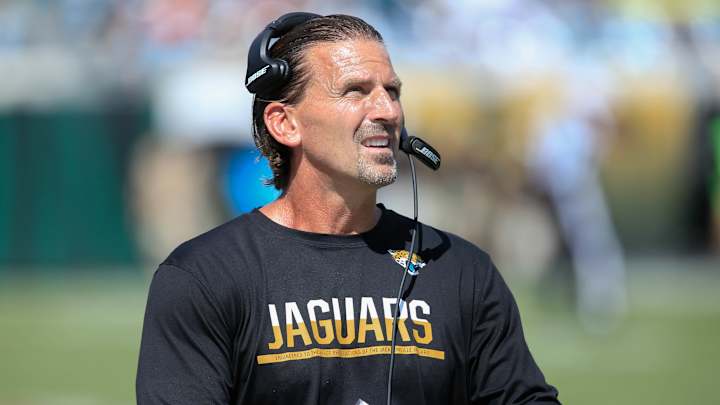Why Have the Jaguars Had So Much Turnover at Offensive Coordinator in Recent Years?

When the Jacksonville Jaguars select their offensive coordinator, it may be more prudent for the new play-caller to rent, and not own, considering the team's recent history at a vital position on the coaching staff.
Jacksonville has had its current vacancy at offensive coordinator since the departure of John DeFilippo on Monday, which was called a mutually parting of ways by the club. When the team hires a new offensive coordinator, which could be Jay Gruden, Ben McAdoo, or Scott Linehan, it will be the third play-caller in as many years for head coach Doug Marrone, and his third coordinator in four seasons.
But the Jaguars' turnover at offensive coordinator in its recent era dates back a few years earlier than Marrone. When the Jaguars hire a new coordinator, it will be their sixth since 2012, with no coordinator lasting more than two seasons.
Jacksonville replaced its entire staff, led by head coach Mike Mularkey, after the 2012 season, and this included offensive coordinator Bob Bratkowski, who served in the position for one season. Bratkowski's firing was hardly a surprise considering the wholesale changes coming to the Jaguars under owner Shad Khan and general manager Dave Caldwell.
In 2013, first-year head coach Gus Bradley hired Jedd Fisch to be his first offensive coordinator. Fisch would last only 32 games as play-caller, though. He was fired two days after the 2014 season finale after rookie quarterback Blake Bortles struggled to transition to the NFL. The Jaguars averaged 15.6 points per game (worst in the NFL) that season and ranked 31st in the NFL in passing and 21st in rushing.
After two offensive coordinators in three seasons, Bradley and the Jaguars turned to a veteran offensive coach in Greg Olson to lead the offense. Olson led the offense to a solid season in 2015, with the offense ranked 14th in points per game and third in passing touchdowns. Olson would last only 24 games as coordinator, though, as he was fired following Week 8 in 2016 as the Jaguars' offense regressed.
Replacing him at the midpoint of the season was Nathaniel Hackett, who would be retained in the role by new head coach Doug Marrone in 2017. Hackett oversaw the most efficient and productive Jaguars' offense of the decade, with the team finishing sixth in total yards, fifth in points, first in rushing yards, and second in rushing scores.
Hackett would too find himself on the chopping block, though, following in the steps of Fisch and Olson before him. He was fired after Week 12 of the 2018 season, culminating his 35-game run as play-caller. The biggest reasons he was ousted centered around, once again, a regression of the offense and Blake Bortles. He was the longest-tenured coordinator since 2012.
To replace Hackett, Marrone hired John DeFilippo to lead the offense in 2019 and beyond. This relationship would be short-lived, however, after DeFilippo lasted only 16 games before leaving the position. In his lone year as coordinator, DeFilippo's offense finished 26th in points, 24th in yards, and 32nd in rushing scores with only three.
A big part of DeFilippo's struggles in Jacksonville centered around the fact that Nick Foles, a giant free-agent addition paired with DeFilippo during the 2019 offseason, was a bust. Foles started only four games due to both injury and poor performances and was outshined by rookie quarterback Gardner Minshew II every step of the way.
So after looking at the circumstances that have led to changes that have besmirched the Jaguars' offensive coordinator position, what takeaways can we have?
The common denominator is bad quarterback play. Bortles' struggles in 2014, 2016, and 2018 all led directly to the Jaguars' head coach having to pull the plug on their coordinators in an attempt to both jumpstart the offense as well as save their own jobs. Foles being a disaster in 2019 certainly played a role in DeFilippo's short term as well.
Since 2013, Jacksonville has only had two head coaches and two defensive coordinators. But once either Gruden, McAdoo, Linehan, or whoever else is hired, it will be the fifth offensive coordinator in that span. Why is this? It is simple: because offense and quarterbacks rule in today's NFL. If you have a bad offense or a bad quarterback, then your job isn't safe.
The Jaguars have been the poster boys for bad offenses and bad quarterbacks since 2013. The latter directly affects the former, though. When a team starts as many struggling quarterbacks as Jacksonville has in recent years, changes shouldn't be surprising. If anything, they should be expected.

John Shipley has been covering the Jacksonville Jaguars as a beat reporter and publisher of Jaguar Report since 2019. Previously, he covered UCF's undefeated season as a beat reporter for NSM.Today, covered high school prep sports in Central Florida, and covered local sports and news for the Palatka Daily News. Follow John Shipley on Twitter at @_john_shipley.
Follow _john_shipley